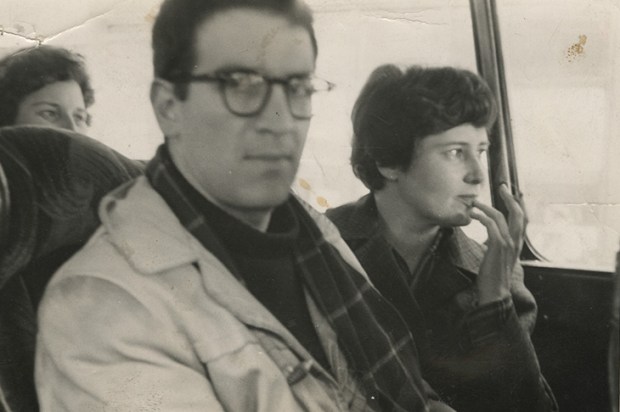Groucho Marx was delighted when he heard that the script for one of his old Vaudeville routines was being reprinted in H.L. Mencken’s The American Language. ‘Nothing I ever did as an actor thrilled me more,’ he said. Indeed, argues Lee Siegel in his brief biographical study of the most verbal Marx Brother, Groucho’s ‘greatest regret in life … was that he had become an entertainer rather than a literary man’. How else to explain that excruciating evening in June 1964 when Groucho and his wife dined at the home of Mr and Mrs T. S. Eliot and Groucho thought to lecture Eliot on King Lear?
To be fair, it was Eliot who, three years earlier, had written to the then 71-year-old Groucho requesting a photograph of his favourite funnyman. A picture arrived by return — though not, alas, the kind that Eliot had in mind. He wanted a portrait of Groucho as Groucho — wire-rimmed specs, six-inch stogie, paint-on moustache. Might he have another? Two years later, a second picture landed on the Eliot doormat. Siegel makes much of that delay. ‘Perhaps,’ he muses, ‘the secretly aspiring literary man resented being asked for a picture of himself in the character of the comic he had become.’ As he says, perhaps. Then again, perhaps Groucho’s secretary was busy with requests from other fans. Or maybe she’d run out of pictures of him in full make-up.
Making mountains out of molehills is pretty much the whole of Siegel’s critical method. Given Groucho’s Jewishness, he could hardly avoid mentioning Eliot’s anti-Semitism. But he fills pages with fanciful ruminations (‘it’s possible’, ‘could not have been unaware’, ‘seemed to provoke’) that tell you nothing concrete — or anything even vaguely plausible — about relations between the two men.
Soon enough Siegel has abandoned suspicions for certainty. He knows what people really mean even when they’re trying to hide it. Take the letter Eliot sent Groucho telling him that he and his wife had recently enjoyed one of his old movies. To you and me it reads utterly innocuously. But the all-seeing Siegel is on hand to write between the lines:
Not long ago we went to see a revival of The Marx Brothers Go West [one of your worst films], which I had never seen before [even though it came out 22 years ago]. It was certainly worth it. [It was certainly not worth it, or I wouldn’t declare that it was.]
When not doing the poet in different voices, Siegel gives us the barest outline of the Groucho story. We get sketches of the hardscrabble childhood in turn-of-the-century New York, the Marx Brothers’ apprenticeship years on Broadway, the anarchic genius of their first movies with Paramount, the decline into formulaic light opera that followed their move to MGM, and Groucho’s reinvention as a quiz-show host in the 1940s and 1950s. But sketches are all they are.
Siegel follows Stefan Kanfer (the author of the most recent — and best — Groucho biography) in believing that Groucho’s position as middle child in a family of five boys meant that he was ‘largely lost in the familial tumult’ and that his motor-mouthed comic technique grew out of his having been ‘unseen and unheard’. He also believes that the insistence of Groucho’s martinet mother Minnie that he forget his dream of studying medicine and go into showbiz instead (he had a passable singing voice), resulted both in the bookishness of his later years and the rampant misogyny of so much of his comedy.
But though Kanfer’s book pretty much proves how woman-hating the real-life Groucho was, how misogynist was his humour? Characters like Otis B. Driftwood and Wolf J. Flywheel enjoy insulting girls, to be sure. But it is the men played by Chico and (especially) Harpo Marx who conceive of women as little more than human spittoons. Siegel himself half acknowledges the point when he quotes the great speech from Duck Soup in which Groucho’s Rufus T. Firefly tears a strip off Mrs Teasdale (Margaret Dumont) for suggesting he is the ‘most able statesman in all Freedonia’. ‘Well,’ says Firefly, ‘that covers a lot of ground. Say, you cover a lot of ground yourself. You better beat it. I hear they’re going to tear you down and put up an office building.’ As Siegel says: ‘Anyone who thinks Firefly would make a good leader of anything, let alone a country, deserves all the insults that could be hurled at her or him.’
Awkward phrasing aside, that’s a rare light moment amid Siegel’s ceaseless seriousness. So ceaseless is it that Groucho Marx: The Comedy of Existence can have you doubting the existence of comedy. A Marx Brothers movie, Siegel tells us, ‘presents a bewilderment… a nihilism constructed out of countless fragments of mutually contradicting truths that amount to no stable meaning. ‘
On the other hand, at least it’s now clear why, a couple of years ago, Siegel was to be found arguing in a New Yorker blog that it was time to bury the hatchet-job review. ‘From the moment I picked your book up until the moment I put it down I was convulsed with laughter. Some day I intend to read it.’ That was Groucho Marx on S. J. Perelman’s first effort. Presented with Lee Siegel’s book, he’d be rather less kind.






Comments